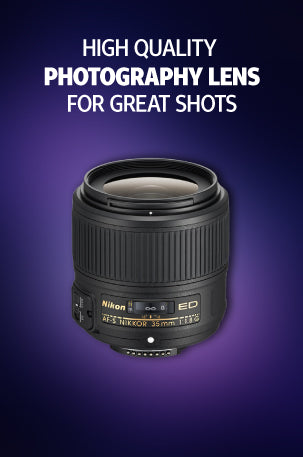Your cart is currently empty.
Which Kind of Camera is Better for Your Style of Photography: Mirrorless or DSLR?
In the early days of digital photography, mirrorless cameras were viewed as novelties, and no self-respecting professional (or aspiring one) photographer would own one. However, the world has moved on and mirrorless cameras have advanced significantly. It has progressed to the point that many professionals are attempting to choose between mirrorless cameras and DSLR cameras when making their purchase.
We took our time reviewing both to remove any uncertainty about which kind of camera is ideal for you. Here is what we discovered.
Weight and Size
Weight is one of the most frequently mentioned benefits of a mirrorless camera over a DSLR. For one simple reason—the mirrorless camera lacks an internal mirror system, which accounts for a sizable portion of DSLR cameras' weight—the mirrorless camera weighs noticeably less overall than a DSLR.
Of course, adding lenses will increase the weight of the camera, but overall, a mirrorless camera has an edge over a DSLR in that it is lighter and easier to handle, especially when numerous cameras are needed.
Battery Life
Battery life is another factor to take into account when deciding between mirrorless cameras and DSLR cameras. Mirrorless cameras typically use up their battery life far more quickly than DSLR cameras due to the nature of their design. This is due to the fact that not only does the mechanism used to take pictures use more power (the absence of a mirror necessitates a digital function to block as well as allow light on the camera sensor), but also the lack of an optical viewfinder necessitates the camera maintains a bright LCD screen all the time.
As a result, mirrorless cameras' batteries discharge quickly. Additional digital functions, such as image editing or sharing after shooting, might add to the drain. Similar features on DSLR cameras may also shorten their battery life, but since a DSLR camera lacks an LCD screen and has a real mirror to direct light to the sensor, its battery life is longer, making it the best choice for carrying on extended picture shoots.
Focus and Picture Quality
Due to the contrast detection focusing mechanism employed by mirrorless cameras, photographers have historically avoided using them. This method of focusing essentially locates the most contrasted part of an image and focuses there. Most of the time, it produces sharp focus, although it is slow—especially when a full frame or crop frame sensor is being used.
DSLR cameras, on the other hand, employ phase detection auto-focus, which selects the ideal point of focus by comparing variations of a picture taken from various angles. Even though it seems slow, especially in low-light conditions, doing this is significantly faster than attempting to locate the point of greatest contrast.
Modern mirrorless cameras are better made than their predecessors, and some of them now have both contrast as well as phase detection, which improves focus in low light and speeds up focus in all conditions. However, because they use digital displays rather than optical viewfinders, they are still on par with DSLR cameras in terms of quality. An optical viewfinder typically provides you with a more precise depiction of the picture you are taking, which lowers the bar for user-initiated focusing mistakes.
Finally, both types of cameras have comparable image quality. Since both mirrorless and DSLR cameras employ the same kinds (and even brands) of sensors, you may expect similar quality from any type of camera. Image quality is dependent on the sensor that is used to take the picture.
Final Word
Photographers can choose from a wide variety of interchangeable lenses with both mirrorless and DSLR cameras, and mirrorless cameras have advanced significantly since their inception. In fact, mirrorless cameras have advanced so far that some professional photographers are already using them as part of their standard setup. In addition to being lighter than DSLRs, several mirrorless cameras now have focused mechanisms that are on par with those of DSLRs.
The majority of professional photographers still like DSLRs because, despite their weight, they take excellent images in all lighting conditions and have longer battery lives, making them more dependable.
















